South Africa launches the world's largest hydrogen-fueled truck, featuring a two-megawatt nuGen™ powerplant for emission-free operation with a 300-tonne payload capacity. The truck demonstrates performance equal to traditional diesel vehicles and generates six terabytes of data for system optimization. This environmentally friendly technology reduces carbon emissions by up to 80%, aligning with global decarbonization goals. Although facing challenges like high initial costs and limited refueling infrastructure, advancements in hydrogen fuel cell technology show promise for efficiency improvements. The truck's launch sets new standards for sustainable transportation, signaling a proactive step towards combatting climate change and inspiring further innovation in the field.
Key Takeaways
- South Africa launches the world's largest hydrogen-fueled truck for mining operations.
- The truck showcases emission-free operation and full payload capacity in challenging conditions.
- It aligns with decarbonization goals, reducing up to 80% of diesel emissions.
- Collaborations with partners like First Mode and Anglo American drive hydrogen innovation.
- The launch signifies a proactive step towards a greener, sustainable future.
South Africa's Groundbreaking Hydrogen Truck Launch
The groundbreaking launch of South Africa's hydrogen truck heralds a new era in sustainable transportation. This innovative vehicle emits only water vapor, reducing diesel emissions by up to 80%. Powered by hydrogen fuel cells, the truck operates as a zero-emission vehicle, aligning with global efforts to combat climate change.
The utilization of green hydrogen technology in this truck represents an important step towards a low-carbon economy. It aims to replace traditional diesel-powered trucks, contributing to essential carbon neutrality goals. The introduction of this hydrogen truck marks a strategic move towards sustainable economic development, particularly within the mining industry.
South Africa's commitment to embracing green hydrogen showcases the nation's dedication to reducing its carbon footprint and shifting towards cleaner energy sources. This initiative highlights the importance of the hydrogen ecosystem in fostering future economic growth and promoting environmentally friendly practices, especially in industries like mining.
Key Features of the Hydrogen-Fueled Truck
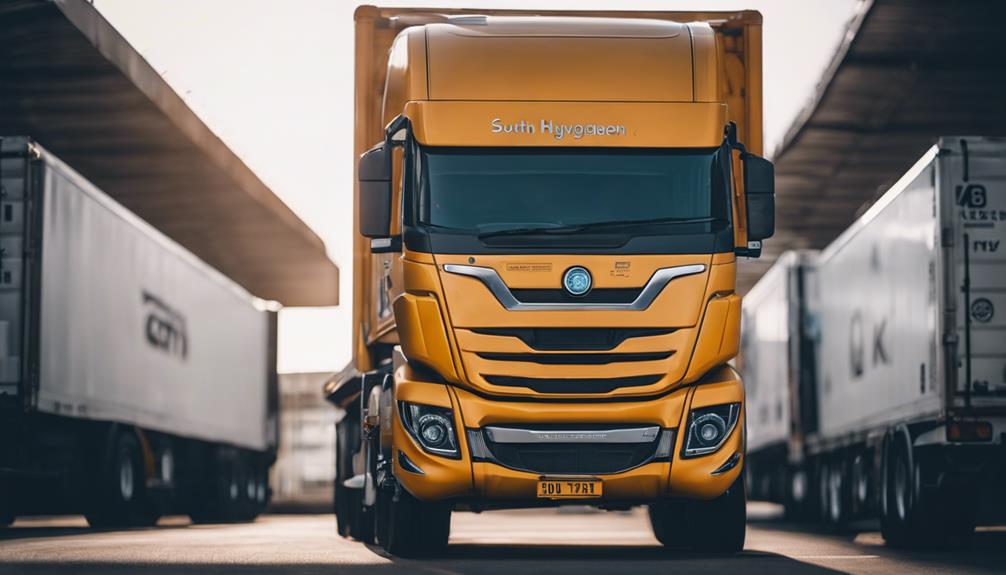
Amidst the landscape of sustainable transportation, the hydrogen-fueled truck presents a revolutionary approach to zero-emission haulage with its innovative features.
The truck is equipped with a two-megawatt nuGen™ powerplant that integrates hydrogen fuel cells and batteries, enabling it to operate emission-free. This cutting-edge design allows the truck to maintain a full payload capacity of 300 tonnes even under typical mining conditions, matching the performance of diesel trucks.
With 1,245 hours of operation logged, the hydrogen-fueled truck has demonstrated performance parity with traditional diesel vehicles. Data analysis from its operations has yielded six terabytes of critical information, which is used for system optimization.
Looking ahead, the next generation nuGen™ powerplant will leverage software learnings to enhance performance, reliability, and safety, aiming to deliver broader operating performance benefits. The hydrogen fuel cell technology in this truck marks a significant advancement in sustainable transportation, showcasing the potential for zero-emission haulage in the future.
Advantages of Hydrogen Fuel in Transportation
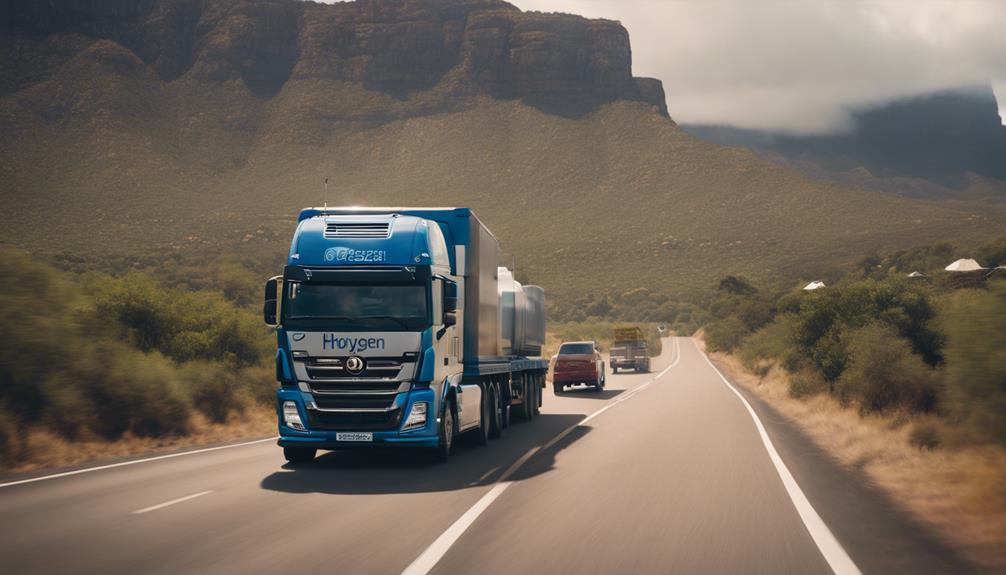
Hydrogen fuel in transportation offers zero emissions, with hydrogen-powered vehicles only emitting water vapor, greatly reducing environmental impact.
The efficiency in the fueling process makes hydrogen a promising alternative, supporting the shift to a cleaner and more sustainable mode of transportation.
The potential for widespread adoption of hydrogen fuel presents a valuable opportunity to address carbon emissions and promote eco-friendly transportation solutions globally.
Environmental Benefits of Hydrogen
Shifting to hydrogen fuel in transportation greatly reduces harmful emissions, providing a sustainable and environmentally friendly alternative to traditional diesel vehicles. Hydrogen fuel used in transportation emits only water vapor, cutting down up to 80% of diesel emissions.
This shift aligns with the global push towards a low-carbon economy, with green hydrogen technology poised to replace diesel-powered trucks. Countries like South Africa are embracing this change, supported by investments and technical aid amounting to $8.5 billion dedicated to fostering the move towards low-carbon technologies, particularly hydrogen-powered trucks.
The environmental benefits of hydrogen are significant, as it not only mitigates harmful emissions but also supports the sustainability agenda by offering a clean energy solution for transportation. By opting for green hydrogen over diesel, nations can reduce their carbon footprint and contribute to a cleaner, greener future for generations to come.
Efficiency in Fueling Process
With refueling times comparable to conventional vehicles, hydrogen fuel offers an efficient solution for transportation needs. The hydrogen fueling process is swift, taking only a few minutes, which is ideal for drivers on tight schedules. This efficiency is a significant advantage, especially for long-haul transportation where quick refueling stops are essential.
Unlike electric vehicles, hydrogen fuel provides a longer driving range, making it a practical choice for vehicles that need to cover extensive distances without lengthy charging times. The expansion of hydrogen fuel stations globally further supports the growth of hydrogen-powered vehicles, enhancing their accessibility and usability.
Additionally, the versatility of hydrogen fuel allows it to be utilized in various modes of transportation, from trucks to buses and cars. What's more, the production of hydrogen fuel can be sourced from renewable energy, aligning with sustainable practices and contributing to a greener transportation sector overall.
Potential for Widespread Adoption
Considering the environmental benefits and efficiency of hydrogen fuel in transportation, its potential for widespread adoption is becoming increasingly evident. The advantages of hydrogen fuel in transportation include:
- Zero-emission: Hydrogen fuel offers a zero-emission alternative for transportation, notably reducing carbon emissions and helping combat climate change.
- Improved Air Quality: The use of hydrogen fuel in transportation improves air quality, especially in mining areas, by decreasing air pollution and promoting cleaner surroundings.
- Lower Environmental Impact: Hydrogen-powered vehicles like haul trucks have a diminished overall environmental impact than traditional diesel trucks, contributing to a more sustainable transport sector.
- Decarbonization Alignment: Green hydrogen production, utilized in the hydrogen-fueled truck, is sustainable and aligns with decarbonization goals, supporting a shift towards cleaner energy sources and reducing reliance on fossil fuels.
The challenges in widespread adoption of hydrogen fuel, such as initial costs, infrastructure limitations, and safety considerations, are being addressed as the benefits of decarbonization and zero-emission transportation become more prominent.
Impact on Reducing Carbon Emissions
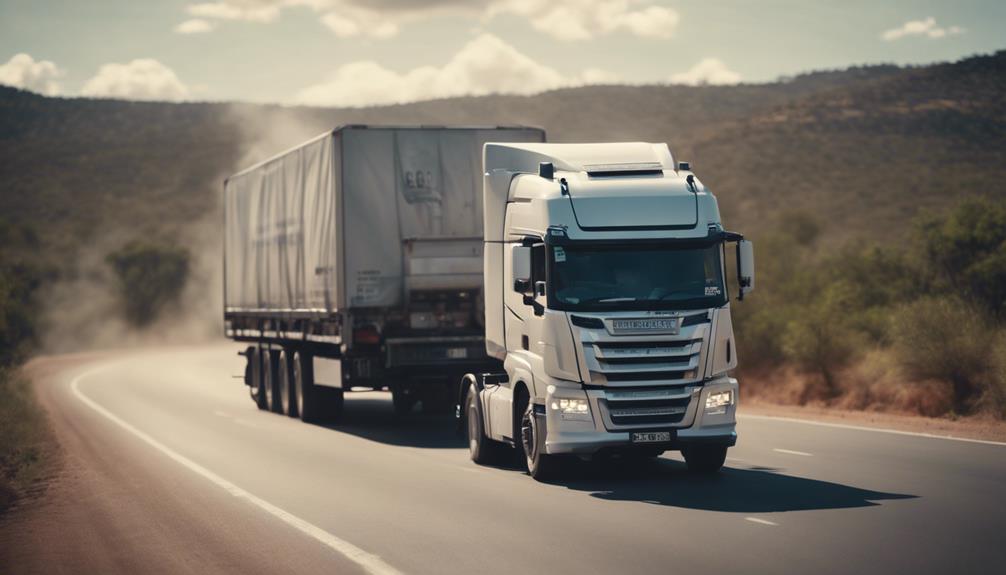
The introduction of hydrogen-fueled trucks in South Africa is poised to greatly reduce carbon emissions in the transportation sector by up to 80%, showcasing tangible environmental benefits. This shift to green hydrogen technology aligns with the global push towards a low-carbon economy, marking an important step in mitigating the carbon footprint associated with mining operations.
The pilot project's goal to demonstrate the scalability of zero-emission haulage systems underscores the industry's commitment to embracing sustainable practices for a greener future.
Carbon Emission Reduction Strategies
Shifting to hydrogen-powered trucks greatly decreases carbon emissions, aiding the move towards a low-carbon economy.
Here are four strategies showcasing the impact of hydrogen-powered trucks on reducing carbon emissions:
- Reduced Diesel Emissions: Moving to hydrogen-powered trucks can decrease diesel emissions by up to 80%, greatly lowering the carbon footprint associated with traditional diesel-powered vehicles.
- Emission-Free Operation: The nuGen haul truck emits only water vapor, showing a substantial reduction in environmental impact compared to diesel trucks, making it an important step towards achieving carbon neutrality.
- Elimination of Diesel Emissions: Hydrogen technology in mining aims to eliminate up to 80% of diesel emissions, aligning with global efforts to reduce carbon emissions and combat climate change effectively.
- Sustainable Mining Operations: Green hydrogen technology replacing diesel-powered trucks is a pivotal strategy in promoting sustainable and environmentally-friendly mining operations, contributing to a cleaner and greener future for the industry.
Environmental Benefits Realized
With the adoption of hydrogen-fueled trucks, a substantial reduction in carbon emissions is achieved, marking a noteworthy milestone in the mining industry's environmental sustainability efforts.
The shift towards green hydrogen technology enables these trucks to emit only water vapor, drastically reducing up to 80% of the diesel emissions typically produced by conventional vehicles. This change aligns with the global push towards a low-carbon economy, showcasing the industry's commitment to environmental responsibility.
By embracing hydrogen-powered trucks, the mining sector takes an essential step towards carbon neutrality, contributing greatly to mitigating climate change effects.
The utilization of green hydrogen in mining operations not only reduces carbon emissions but also demonstrates a clear dedication to clean energy transitions and sustainable practices. This proactive approach to adopting zero-emission technology underscores the industry's determination to decrease its carbon footprint and play an active role in shaping a more environmentally friendly future.
Challenges and Future Prospects

Despite facing various obstacles, hydrogen-powered vehicles show promising potential in transforming the transportation industry towards a more sustainable future. To illustrate this point further, here are some important aspects worth contemplating:
- High Initial Costs: The investment required for hydrogen-powered haul trucks can be substantial, impacting initial adoption rates.
- Limited Infrastructure: The lack of widespread refueling stations hinders the scalability of hydrogen-powered vehicles.
- Technological Constraints: Advancements in hydrogen fuel cell technology are necessary to enhance efficiency and performance.
- Regulatory Obstacles: Clear guidelines and incentives from governments can accelerate the integration of hydrogen-powered trucks into mainstream transportation.
While these challenges exist, the future prospects for hydrogen-powered haul trucks are bright. Through advancements in green hydrogen production and continued innovation, these vehicles offer a pathway to a more sustainable and environmentally friendly transportation sector.
Technology Behind Hydrogen-Powered Trucks
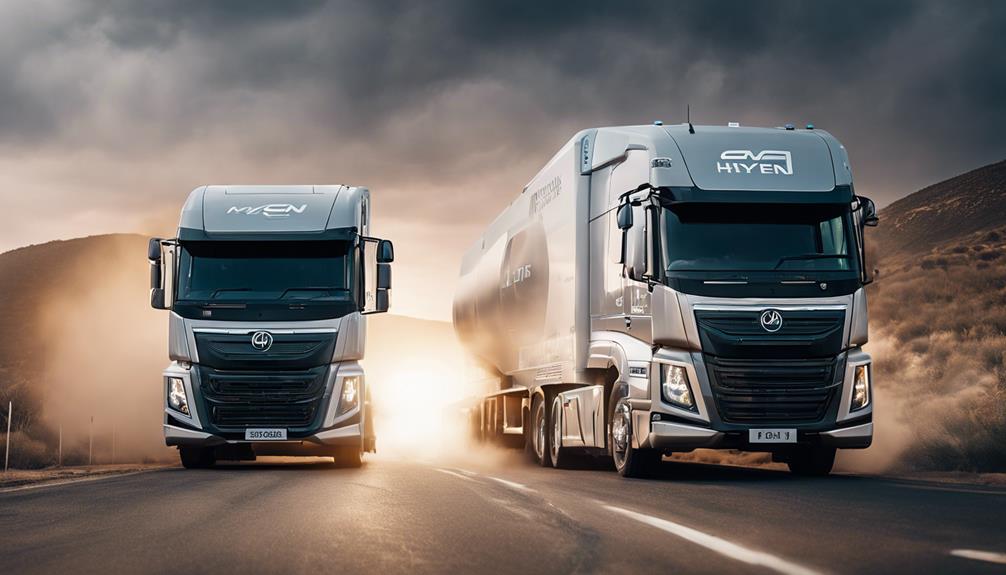
The technology behind hydrogen-powered trucks involves utilizing a two-megawatt powerplant that combines hydrogen fuel cells and batteries for emissions-free operation.
With eight 100 kW hydrogen fuel cell modules and a 1.1 MW lithium-ion battery pack, the truck can achieve a peak power output of 2 MW, enabling it to carry a full payload of 300 metric tons.
This advanced setup not only enhances performance but also showcases the advantages of hydrogen fuel in the transportation industry.
Hydrogen Fuel Advantages
Harnessing advanced hydrogen fuel cell technology, the world's largest zero-emission haul truck achieves peak power output of two megawatts. The utilization of hydrogen fuel in trucks offers several advantages in promoting clean energy and reducing carbon emissions:
- Zero Emissions: Hydrogen fuel cells produce only water and heat as byproducts, making them a clean energy source that doesn't emit harmful pollutants into the environment.
- Performance Parity: The hydrogen-fueled haul truck demonstrated comparable performance to diesel trucks, maintaining a full payload capacity of 300 tonnes under typical mining conditions.
- Data Optimization: Capturing six terabytes of critical data allows for system optimization, enhancing performance, reliability, and safety of the hydrogen-powered haul trucks.
- Green Hydrogen Production: Green hydrogen produced on-site using solar power is essential for powering the hydrogen fuel cell trucks, ensuring a sustainable and environmentally friendly energy source for transportation.
The adoption of hydrogen fuel technology in trucks is essential for industries like mining to reduce their carbon footprint and contribute to meaningful decarbonization efforts.
Truck Performance Comparison
Comparing the performance of hydrogen-powered trucks involves evaluating the innovative technology that integrates hydrogen fuel cells and batteries for efficient zero-emission haulage.
The hydrogen-fueled nuGen haul truck demonstrated remarkable performance parity with diesel trucks, showcasing a full payload capacity of 300 tonnes under typical mining conditions while achieving zero-emission haulage.
With 1,245 hours of operation and a peak power output of two megawatts, the truck highlighted its capabilities in sustainable heavy-duty transportation.
Data analysis from the truck not only captured six terabytes of critical data but also enabled system optimization for enhanced reliability and safety.
The next generation nuGen powerplant, incorporating software learnings for improved performance, is poised for deployment at First Mode Proving Grounds in Centralia, Washington, USA.
This system optimization guarantees that hydrogen-powered trucks continue to advance in efficiency and performance, offering a sustainable alternative to traditional diesel trucks in the transportation industry.
South Africa's Sustainable Transportation Initiative
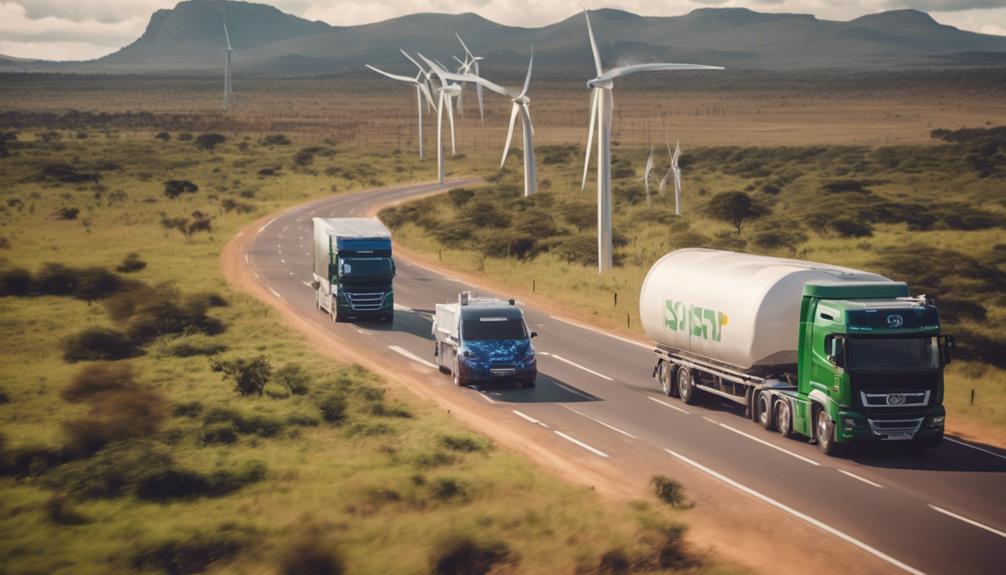
President Ramaphosa's announcement of South Africa's hydrogen ecosystem launch includes the introduction of a hydrogen truck at the Mogalakwena mine site, showcasing the country's commitment to sustainable transportation. This initiative highlights the nation's dedication to reducing carbon emissions in the mining sector through the adoption of zero-emission technology.
To provide a clearer picture, here are four key points regarding South Africa's Sustainable Transportation Initiative:
- Introduction of hydrogen-fueled trucks at the Mogalakwena mine site.
- Use of zero-emission technology to reduce up to 80% of diesel emissions.
- Conversion of diesel trucks to zero-emission haulage.
- Utilization of solar power to produce hydrogen for truck operation.
These steps signify a significant shift towards sustainable economic development in South Africa by embracing environmentally friendly practices in the transportation sector. By incorporating green hydrogen technology, the country isn't only reducing its carbon footprint but also setting a precedent for a more environmentally conscious approach to mining operations.
Global Implications of the Hydrogen Truck Launch
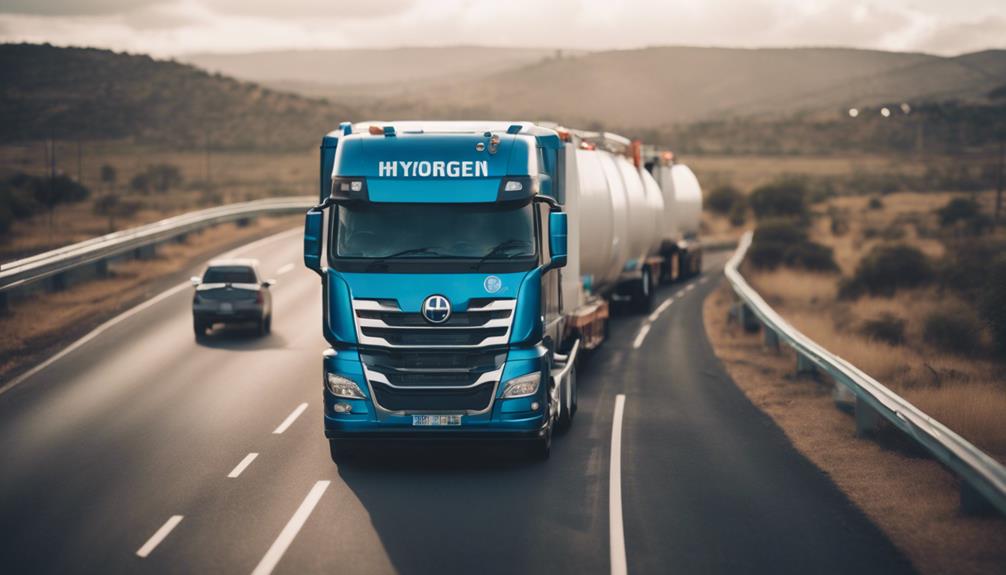
The deployment of hydrogen-powered trucks by Anglo American at the Mogalakwena mine site signals a significant advancement in reducing diesel emissions and promoting sustainable practices in the global mining industry.
The introduction of hydrogen technology in haul trucks not only aids in decarbonization but also sets a new standard for environmentally friendly practices in heavy-duty vehicle operations.
The global expansion of hydrogen-powered trucks, with plans for deployment at various mining sites in South Africa, Chile, and beyond, demonstrates a commitment to combatting climate change and moving towards carbon neutrality on a broader scale.
By embracing hydrogen technology, the mining sector is taking proactive steps towards achieving meaningful decarbonization goals and inspiring climate action worldwide.
This shift towards sustainable economic development in mining not only benefits local environments but also sets a positive example for industries globally, showcasing the potential for hydrogen fuel to revolutionize heavy-duty transportation and contribute to a cleaner, greener future.
Hydrogen Fuel Adoption in Heavy-Duty Vehicles
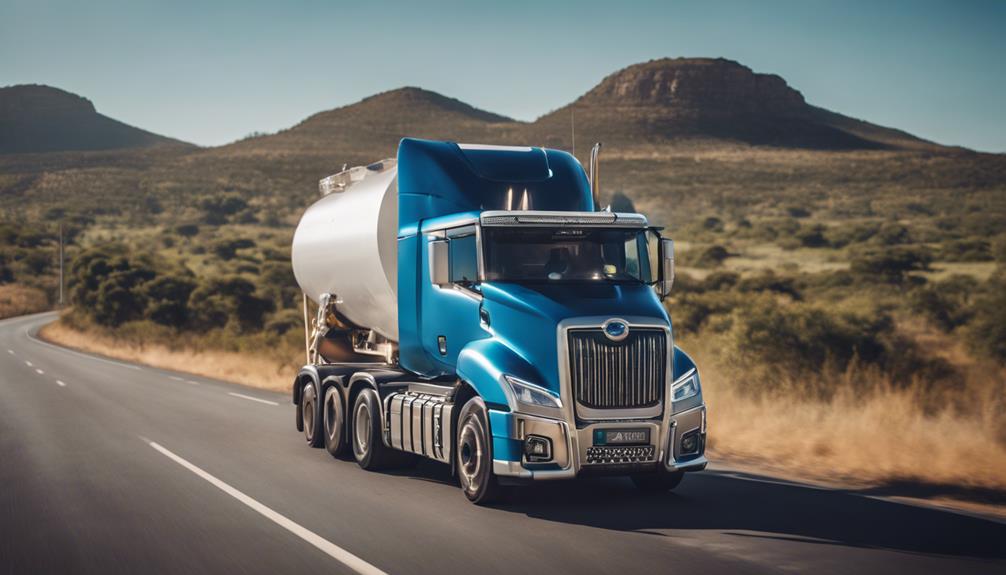
Hydrogen fuel adoption in heavy-duty vehicles offers numerous benefits such as increased efficiency, reduced environmental impact, and improved overall performance.
By utilizing hydrogen fuel cells and batteries, heavy-duty vehicles can achieve zero-emission haulage, showcasing their potential for sustainability.
The shift to hydrogen-powered trucks not only aligns with decarbonization goals but also sets a precedent for a greener future in the transportation industry.
Heavy-Duty Vehicle Benefits
Adopting hydrogen fuel in heavy-duty vehicles such as haul trucks offers significant environmental and operational benefits. When heavy-duty vehicles shift to hydrogen fuel, they contribute to a cleaner environment by reducing carbon emissions and improving air quality in mining areas. The sustainability benefits of using hydrogen fuel in these vehicles are substantial, lowering the overall environmental impact of mining operations.
Green hydrogen production, which is powered by renewable energy sources, plays a crucial role in ensuring the sustainability of hydrogen-powered heavy-duty vehicles. Despite facing challenges like initial costs, limited infrastructure, safety concerns, and regulatory obstacles, hydrogen-powered heavy-duty vehicles, such as haul trucks, provide various advantages:
- Quieter operation
- Lower maintenance costs
- Longer lifespan
- Increased energy efficiency compared to traditional diesel trucks.
Hydrogen Fuel Efficiency
Incorporating hydrogen fuel into heavy-duty vehicles revolutionizes their efficiency and sustainability, offering a clean and powerful alternative to traditional diesel options.
The hydrogen-fueled haul truck, equipped with hydrogen fuel cells and batteries, showcased zero-emission haulage capabilities at a peak power output of two megawatts. It matched the performance of diesel trucks by maintaining a full payload capacity of 300 tonnes under typical mining conditions.
This was made possible through the integration of eight 100 kW hydrogen fuel cell modules and a lithium-ion battery pack outputting 1.1 MW, with a peak power of 2 MW. Remarkably, the on-site production of green hydrogen using a 3.5 MW electrolyzer powered by a 100 MW solar array minimized environmental impact.
Deploying hydrogen-powered trucks like the nuGen haul truck is crucial for reducing carbon emissions in the mining industry and achieving meaningful decarbonization goals, highlighting the efficiency and promise of hydrogen fuel cells in heavy-duty vehicles.
Environmental Impact Reduction
Shifting heavy-duty vehicles to hydrogen fuel technology offers a sustainable solution to reduce environmental impact and promote carbon neutrality in industrial operations. The adoption of hydrogen-fueled trucks, such as the nuGen haul truck, plays an essential role in moving towards zero-emission haulage systems. Here's how this shift aids in environmental impact reduction:
- Emission Reduction: Hydrogen-fueled trucks like the nuGen haul truck emit only water vapor, greatly cutting diesel emissions by up to 80%.
- Support for Low-Carbon Economy: Embracing green hydrogen technology in heavy-duty vehicles supports the global shift towards a low-carbon economy.
- Carbon Neutrality in Mining: The hydrogen-fueled haul truck at Mogalakwena mine in South Africa signifies a significant advancement towards achieving carbon neutrality in mining operations.
- Sustainable Future: Green hydrogen combustion in vehicles like the nuGen haul truck replaces diesel-powered engines, contributing to a sustainable future for heavy industry.
The deployment of hydrogen-powered trucks showcases a pivotal move towards establishing zero-emission haulage systems, particularly in demanding sectors like open-pit mines.
Economic Benefits of Hydrogen-Fueled Trucks

Hydrogen-fueled trucks offer a noteworthy economic advantage through their potential to reduce carbon emissions and drive sustainable growth in South Africa. By embracing this technology, the country can make substantial strides in carbon emissions reduction, aligning with global efforts to combat climate change.
The shift to hydrogen-powered trucks not only supports environmental stewardship but also positions South Africa for sustainable economic growth. The mining sector, in particular, stands to benefit significantly from the adoption of hydrogen technology, with the potential to reduce diesel emissions by up to 80%.
Investing in green hydrogen production for truck fuel cells not only fosters economic growth but also demonstrates a commitment to sustainable practices. This strategic move towards hydrogen-fueled trucks not only paves the way for sustainable economic development but also showcases a dedication to reducing the carbon footprint within the mining industry.
The economic implications of this shift hold the promise of propelling South Africa towards a greener and more prosperous future.
Environmental Benefits of Hydrogen Fuel Cells
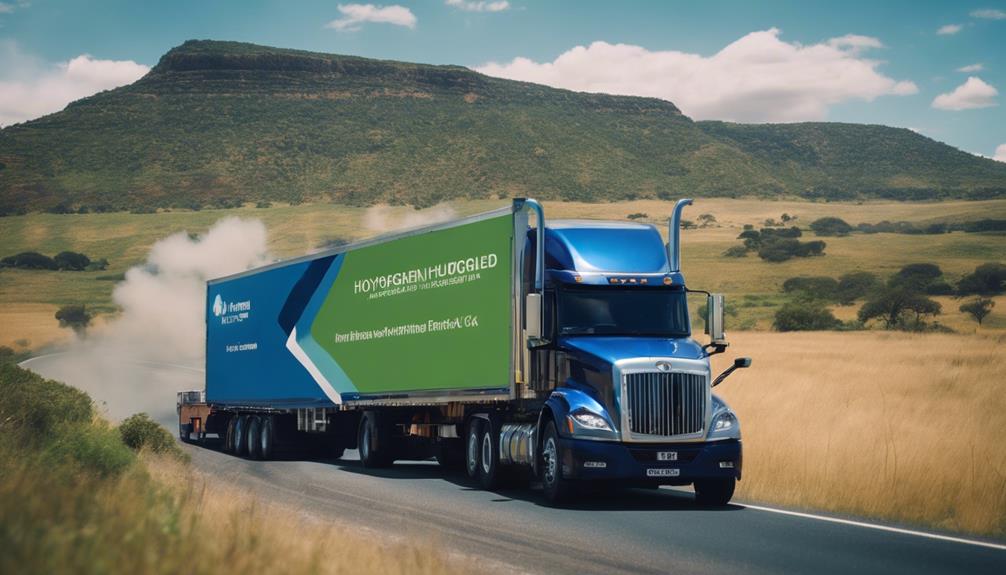
The adoption of hydrogen fuel cells in transportation systems offers a significant advantage in reducing harmful emissions and promoting environmental sustainability. Here are four key environmental benefits of hydrogen fuel cells:
- Reduction of Diesel Emissions: Hydrogen fuel cells, as seen in the world's largest haul truck, emit only water vapor, reducing up to 80% of diesel emissions. This significant reduction in harmful pollutants helps improve air quality and public health.
- Contribution to a Low-Carbon Economy: Embracing green hydrogen technology supports the shift towards a low-carbon economy. By utilizing hydrogen-powered vehicles like the haul truck, we can decrease our reliance on fossil fuels and move towards a more sustainable energy future.
- Cleaner Combustion Process: The combustion process of hydrogen-powered vehicles releases only water vapor, making them environmentally friendly alternatives. This cleaner process contributes to a healthier environment by minimizing harmful emissions.
- Zero-Emission Alternative: Hydrogen-powered haul trucks aim to replace traditional diesel trucks, providing a zero-emission transportation solution. This shift towards zero-emission vehicles aligns with global efforts to combat climate change and reduce our carbon footprint.
Infrastructure Development for Hydrogen Vehicles

Embracing the potential of hydrogen fuel cells in transportation systems necessitates substantial investment in infrastructure development for hydrogen vehicles.
Anglo American's initiative to produce hydrogen on-site using a 3.5 MW electrolyzer powered by a 100 MW solar array showcases an important aspect of this infrastructure. This on-site hydrogen production capacity of up to a metric ton per day serves as a cornerstone for fueling hydrogen fuel cell trucks at mining sites.
The emphasis on green hydrogen aligns with Anglo American's decarbonization objectives for their mining operations. Such developments highlight the importance of establishing efficient hydrogen production facilities, like electrolyzers powered by renewable sources, to support the widespread adoption of hydrogen-powered vehicles.
This infrastructure development not only ensures a sustainable supply of green hydrogen but also contributes significantly to reducing carbon emissions in the transportation sector. It sets a precedent for future endeavors in creating a robust hydrogen infrastructure to propel the shift towards cleaner and more sustainable transportation solutions.
Role of Government in Promoting Hydrogen Technology
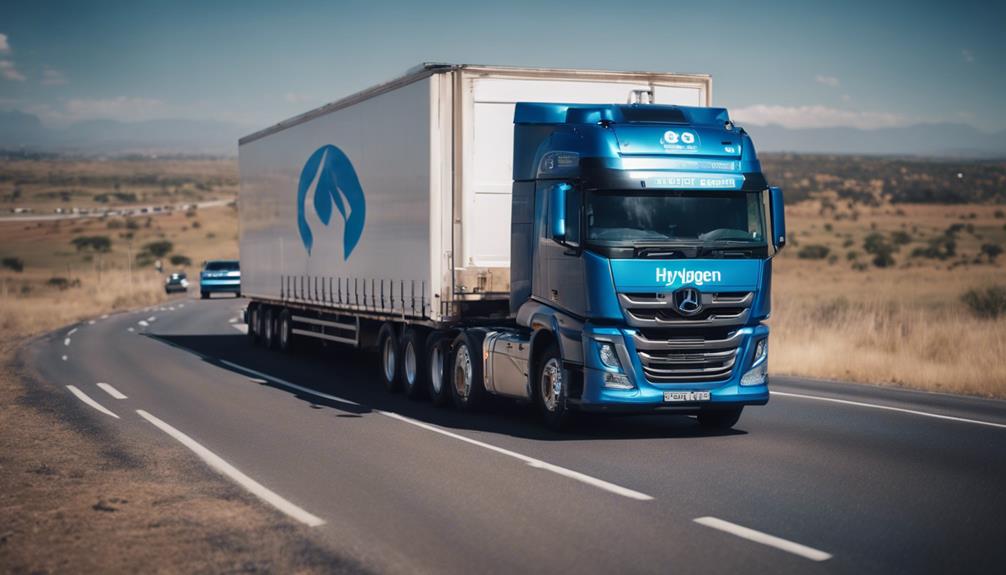
With a strategic focus on sustainability and innovation, South Africa's government plays a pivotal role in driving the adoption of hydrogen technology for economic and environmental advancement. Government initiatives in the country are geared towards promoting the use of hydrogen technology for a cleaner and more sustainable future. Here are some key ways in which the government is actively involved in advancing hydrogen technology:
- Policy Support:
The government has put in place policies that support the development and deployment of hydrogen-powered vehicles, creating a conducive environment for growth in this sector.
- Incentives:
Incentives are being offered to encourage the uptake of hydrogen technology, making it more attractive for businesses and consumers to invest in cleaner energy solutions.
- Environmental Protection:
By promoting hydrogen technology, the government is contributing to efforts aimed at reducing carbon emissions and mitigating climate change impacts.
- Global Alignment:
South Africa's commitment to hydrogen technology aligns with global initiatives towards a cleaner and greener energy shift, showcasing its dedication to sustainable development and innovation.
Collaborations Driving Hydrogen Innovation

South Africa's government's active involvement in advancing hydrogen technology has paved the way for impactful collaborations driving innovation in the sector. One prominent collaboration worth mentioning is the partnership between First Mode and Anglo American, which resulted in the development of the world's largest hydrogen-fueled truck. This initiative specifically aimed at decarbonizing mining fleets by replacing traditional diesel components with zero-emission technology, showcasing a significant step towards sustainability in heavy industry. The hydrogen-powered truck successfully achieved performance parity with diesel trucks, demonstrating its practicality and efficiency in the mining sector. Through meticulous data analysis from operational trials, vital information was gathered to optimize the truck's performance, reliability, and safety standards. Plans are already in motion to scale up and commercialize this hydrogen-fueled haulage solution, with a clear objective of eliminating diesel use in heavy industries like mining.
| Collaboration Partners | Focus | Achievements |
|---|---|---|
| First Mode and Anglo American | Decarbonizing mining fleets | Developed world's largest hydrogen-fueled truck, achieved performance parity with diesel trucks |
Future Outlook for Hydrogen-Fueled Trucks
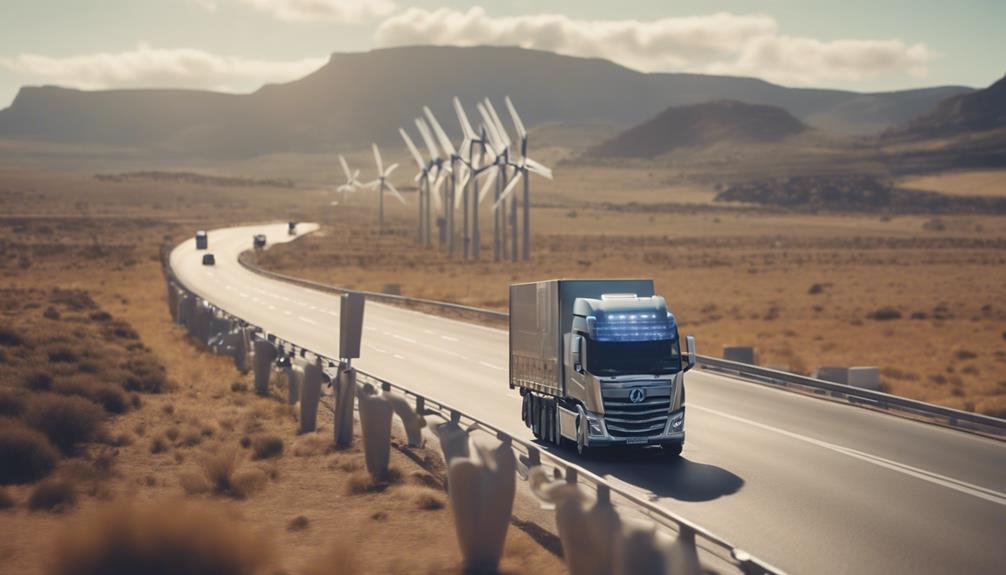
The future of hydrogen-fueled trucks holds promising advancements in sustainable transportation technology. Here are key points to keep in mind:
- Retrofitting Initiatives: Plans are underway to convert 40 diesel-powered haul trucks to hydrogen at the Mogalakwena mine site, showcasing a commitment to shifting towards cleaner energy sources.
- Global Adoption: The worldwide rollout of hydrogen technology across Anglo American's truck fleet signifies a widespread acceptance of hydrogen as a viable alternative fuel for heavy-duty vehicles.
- Environmental Impact: Hydrogen technology plays a vital role in achieving operational carbon neutrality, a significant milestone in reducing greenhouse gas emissions in the transportation sector.
- Industry Transformation: The real-world impact of hydrogen technology extends to reducing emissions in the mining industry, demonstrating the potential for cleaner operations and a more sustainable future.
Partnerships are essential in delivering breakthrough outcomes for hydrogen-powered haul trucks, emphasizing collaboration as a driving force in advancing eco-friendly transportation solutions.
Frequently Asked Questions
What Is the World's Largest Hydrogen Truck?
The world's largest hydrogen truck is a groundbreaking creation by First Mode and Anglo American. It boasts a two-megawatt hybrid hydrogen and battery powerplant, excelling in zero-emission haulage during operational trials.
Matching diesel trucks in performance, it effortlessly carries a 300-tonne payload in mining conditions.
This success sets the stage for the widespread adoption of the nuGen™ Haulage Solution, signaling a cleaner energy shift in heavy industry.
What Is the Hydrogen Powered Truck in South Africa?
The hydrogen-powered truck in South Africa showcases cutting-edge technology with its hybrid hydrogen and battery powerplant. This innovation achieves zero-emission haulage, boasting a peak power output of two megawatts.
Importantly, the truck maintains a full payload capacity of 300 tonnes under typical mining conditions, rivalling diesel trucks in performance. Data analysis from its operations has yielded six terabytes of critical data for system optimization.
This advancement marks a significant step towards carbon-neutral mining operations and sustainable haulage systems for open-pit mines.
How Long Did the Truck Run for on the Hydrogen?
The hydrogen-fueled truck ran for 1,245 hours on hydrogen during its operational trials. It achieved a peak power output of two megawatts, showcasing performance parity with diesel trucks by maintaining a full payload capacity of 300 tonnes under typical mining conditions.
The trials generated six terabytes of critical data for system optimization, with software insights being integrated into the next-generation nuGen™ powerplant for further enhancements.
Is There a Hydrogen Powered Truck?
Yes, there's a hydrogen-powered truck. It's the world's largest zero-emission haul truck, designed by First Mode and Anglo American.
This truck successfully completed operational trials, showcasing the potential of zero-emission haulage in the mining industry.
Conclusion
To sum up, South Africa's launch of the world's biggest hydrogen-fueled truck marks a significant milestone in the advancement of sustainable transportation. By harnessing the power of hydrogen fuel, this technology offers a promising solution to reduce carbon emissions and combat climate change.
While there are challenges to overcome, the future prospects for hydrogen-fueled trucks look promising, with collaborations driving innovation and government support paving the way for a greener future in transportation.










